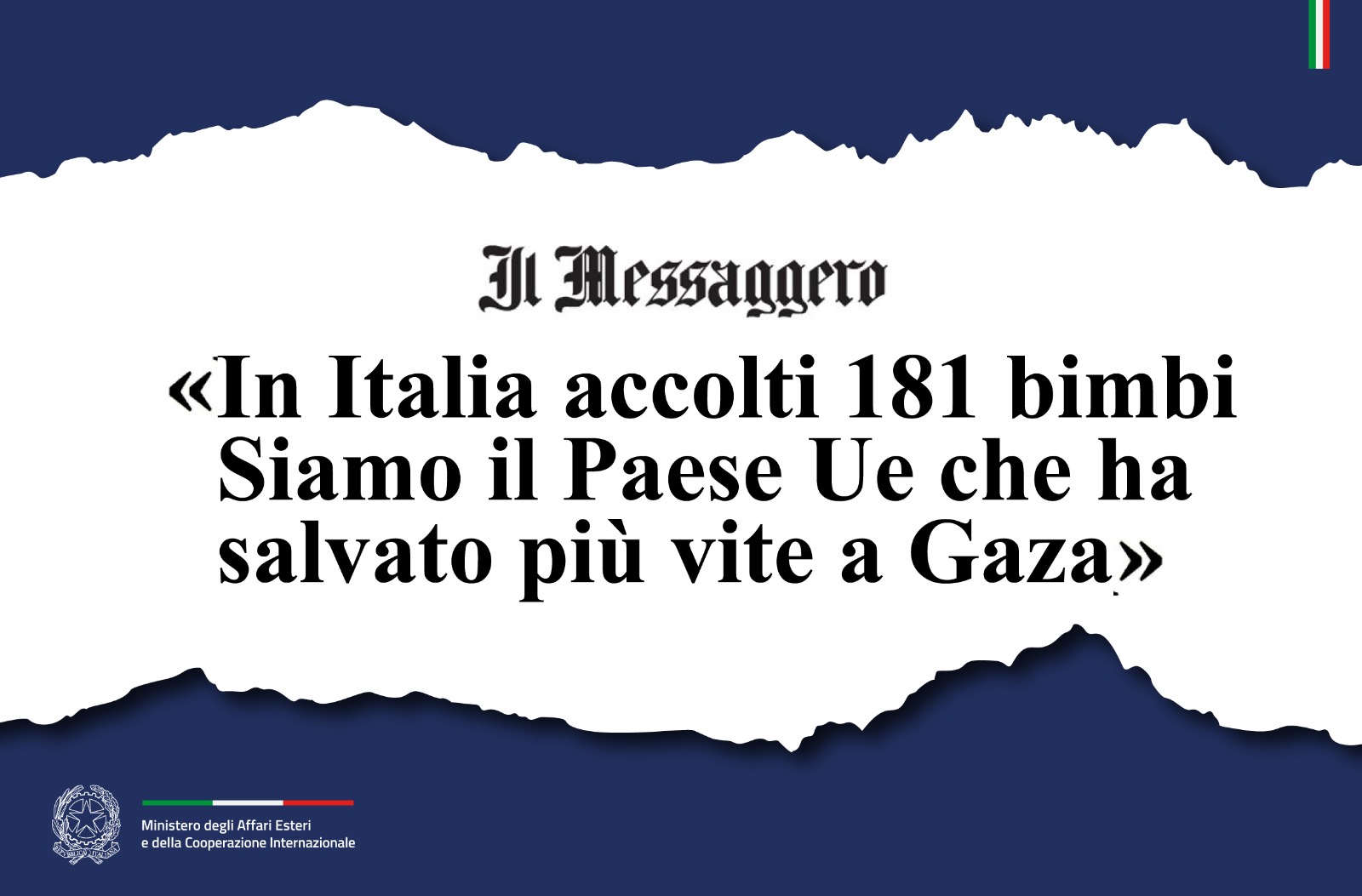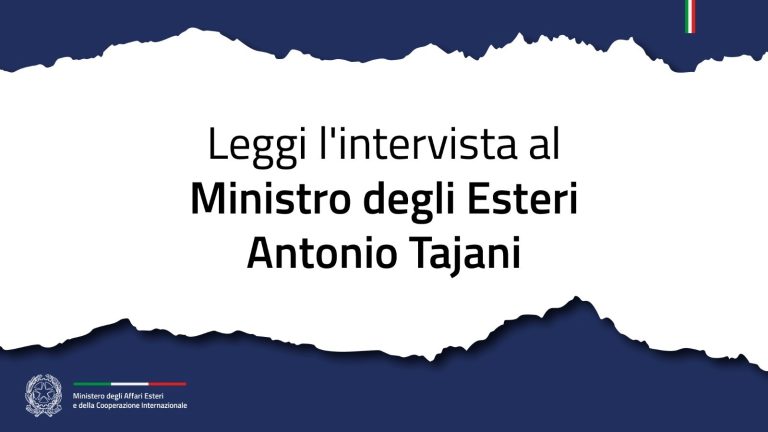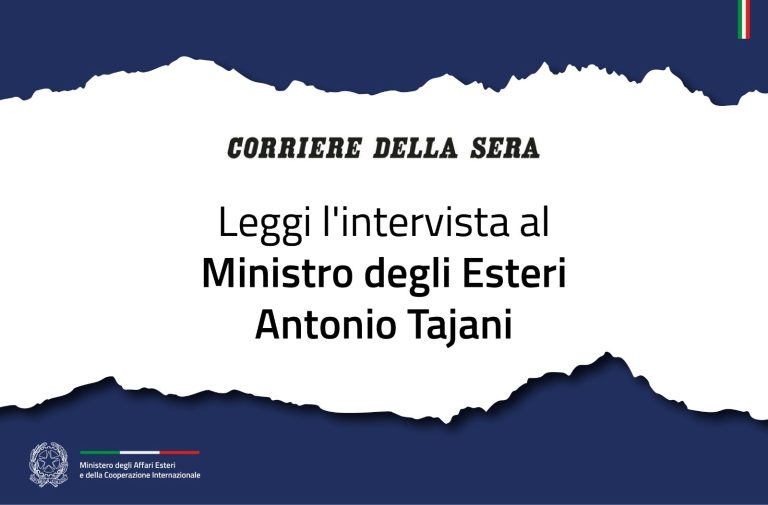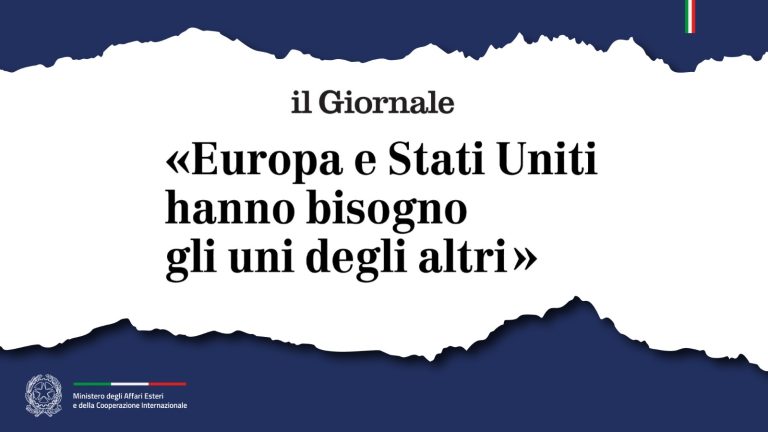We leave sterile debate to others. We are taking concrete action to help the Palestinian people, and we will continue to do so. Tomorrow (today, ed.) we will demonstrate this. Antonio Tajani answers the phone on the eve of the arrival in Rome of the Palestinian National Authority’s Foreign Minister, Varsen Aghabekian. Today, with her, the Deputy Prime Minister will visit some of the children that Italy has managed to evacuate from the Gaza Strip to be treated in Roman hospitals: Umberto I, Bambin Gesù, Gemelli. “We are the fourth country in the world, after Qatar, Saudi Arabia and Egypt, in terms of children rescued from Gaza: we have brought 181 to Italy. More than all the other European countries put together”.
Minister, before talking about Palestine, let us start with French Prime Minister Bayrou’s accusation that Italy is practising “fiscal dumping”.
“I am astonished. This accusation is based on completely flawed reasoning. I do not wish to comment on the political and economic situation in France, but if Italy is on a positive economic path and maintains significant political stability, it is not because it practises fiscal dumping and conspires against other European countries. There are other, real tax havens in Europe. There are other profound anomalies in the EU that should be corrected; these are the anomalies that should be challenged.”
Let us revert to the Gaza issue. People continue to die in the Gaza Strip: some estimates speak of over 120 children dying from malnutrition.
“This is unacceptable. Italy is doing everything possible to alleviate the suffering of civilians, for which Hamas also bears much responsibility. Thanks to the Food for Gaza project, we have brought over 200 tonnes of food into the Gaza Strip since 7 October. We are working continuously with our Crisis Unit, Civil Protection and Defence to evacuate more children and their families, and we hope to bring in many more. It is not easy. But nothing of this would be possible if we cut ties with Israel.”
The government is therefore still opposed to the idea of sanctions against Israel or individual Ministers in Netanyahu’s government?
“Our position, which I fully shared with German Foreign Minister Wadephul on Saturday in Copenhagen, is that violent settlers who also attack Christians in the West Bank must be subject to sanctions. This is extremely severe, not because their lives are worth more, but because Christians are an element of dialogue: attacking their communities and their churches means reducing the possibility of achieving peace.”
Hungary, however, is opposed to sanctions against the settlers. Will you convince it?
“I hope so, because this has nothing to do with friendship with Israel: it is about condemning violent people who are preventing peace from being achieved. Peace must be based on the two-State principle: this is the reason why we say no to any possibility of annexing the West Bank, which would undermine the foundations for the creation of a Palestinian State.”
Is this the message you will deliver to the PNA Minister today?
“The PNA is our counterpart in Palestine and we support it: that is where we need to start in order to create a Palestinian State, whose future must be free from Hamas. We want to do this together with Saudi Arabia, Egypt and the other Arab countries leading this process.”
What role can Italy play?
“As I told the Saudi Minister the day before yesterday, as soon as this phase begins, Italy is ready to send Italian troops under the umbrella of a UN mission based on the UNIFIL model to reunify Gaza and the West Bank. I also reiterate that it is a mistake not to grant a visa to PNA leader Abu Mazen to speak at the United Nations. We need to continue to have a counterpart in the Palestinian world, and that can only be the PNA.”
The government, however, does not recognise the State of Palestine.
“It recognises the Palestinian Authority, not yet a “State” because it does not exist today; it has to be built. Other countries have done so: do you think anything has changed? There are those who make motions and those that try to be useful. First, let us send a signal by imposing sanctions on settlers. As for weapons, whatever anyone says, Italy has not sent any since 7 October.”
How will the killing of the Hamas spokesman affect the war?
“Israel has already won the war against Hamas. Israel has the right to defend its security and demand the release of hostages. But it does not have the right to go beyond the red line of a proportionate response.”
Meanwhile, there is a growing demand for visas for students who have obtained scholarships at Italian universities. Will it be possible to grant them?
“We need to get the students out by making them transit through an Arab country. We have reserved 100 scholarships for Palestinian students. This is our small or large contribution to the training of a new ruling class for the future Palestinian State. Our ambassador to Jordan is currently holding talks to create a “university corridor” from Palestine. It is not easy. We have overcome the bureaucratic problems for issuing visas, but there are still some political positions of countries in the region on which we need to work.”
What about the plan to turn Gaza into a “Riviera of the Middle East?”
“I fear it is a dream. If only Gaza could be turned into the French Riviera, instead of a place of carnage. Any plan can be interesting, but the first thing to do is a ceasefire. And I do not see any encouraging signs.”
There are few signs on the Ukrainian front either.
“I am still very cautious. After the meeting in Alaska, I said that there was light at the end of the tunnel, but we are still in the tunnel. The ball is in Putin’s court, but he is aiming to conquer territories. He has not achieved great results so far, but he has 1.5 million soldiers whom he pays three times the average wage, and an industry that is now a war industry. He cannot easily turn back. He will continue to play for time, let us not kid ourselves.”
Meanwhile, he is seeking an alliance with Xi and Modi. What can the West do?
“Put further pressure on him. With financial sanctions that cut off funding for his army. We discussed this with the other EU Ministers in Copenhagen: the intention is to proceed with a new package of sanctions, which I believe will come quickly”.





